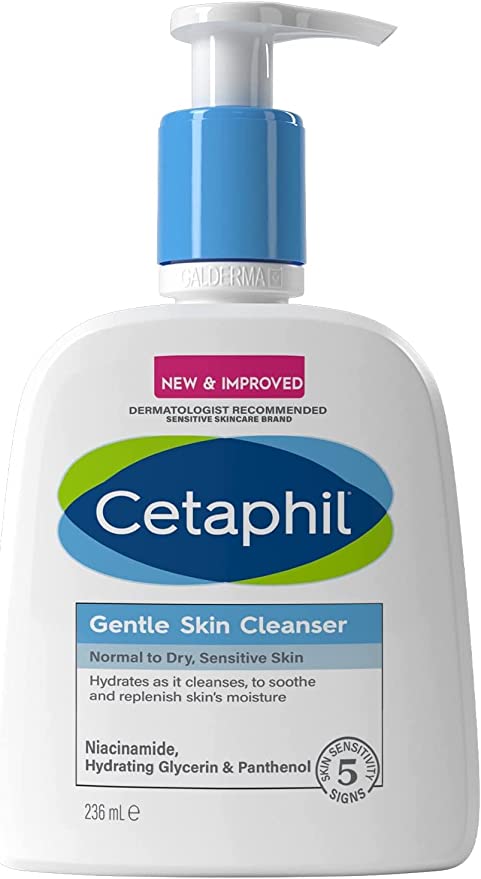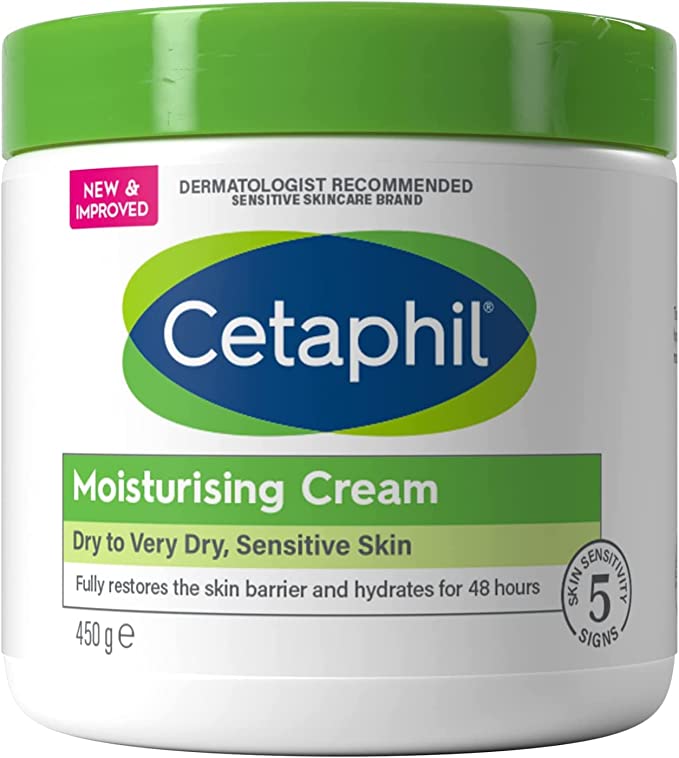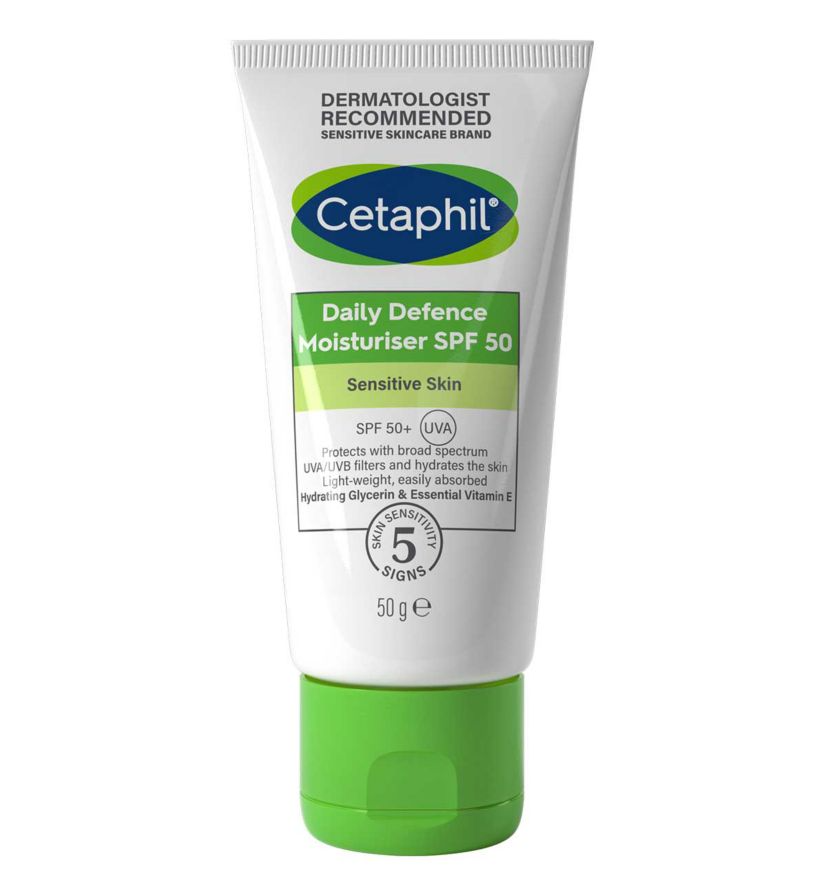This Derm-Approved Skincare Routine Is The Best Way To Look After Sensitive Skin
If you include yourself in the 50-70% of people worldwide who report having some degree of sensitive skin, listen up. With hundreds of skincare products promising to quell your sensitive skin woes, finding the right one for your needs can often feel like looking for a needle in a haystack. The good news is that there are skincare brands out there that have your skin’s best interests at heart.
A brand that champions a science-led approach to skin sensitivity, Cetaphil understands that the key component of any great sensitive skincare routine is simplicity. Cetaphil’s simple but effective products are specially formulated to tackle the five symptoms of sensitivity. "The signs of sensitive skin include a weakened skin barrier, irritation, roughness, tightness and dryness," says medical aesthetic clinician Dr Yusra Al-Mukhtar. If these symptoms ring true for you, it’s time to simplify your skincare routine. Here’s how.
AdvertisementADVERTISEMENT
Understand Your Skin Barrier
A key component of sensitive skin is a weakened skin barrier and the more you understand this concept, the better. "Understanding the anatomy of the skin is important," reveals Dr Al-Mukhtar. "We all have a protective fatty outer layer on our skin, called the lipid barrier. Its function is to keep the good things in and the bad things out." Composed of fatty acids, cholesterol and ceramides, when you have sensitive skin, this barrier is usually impaired. "This allows the ingress of chemicals, irritants and bacteria into the deeper skin layers and [the skin] becomes unable to hold vital substances that keep cells intact. This results in sensitive skin," adds Dr Al-Mukhtar. Signs that your skin might be sensitive and its barrier compromised include redness, dryness, roughness, irritation and tightness.
Skin conditions linked with sensitivity, such as eczema, psoriasis and rosacea, are typically related to a genetic issue with the skin barrier. If you experience bouts of sensitivity and do not have a long-term skin condition, it might be a sign that you’re doing something to compromise your skin barrier. Cold weather, drying winds, hot water, sunburn, allergies, over-exfoliation and even stress are all thought to contribute to a weakened barrier.
Go Back To Basics
Now that we understand the causes of sensitive skin, it’s important to know that looking after it relies on simplicity. "Focus on rehydrating and repairing the barrier function of the skin," says Dr Al-Mukhtar. Essentially, you should be looking towards a simple routine that involves three core products: a cleanser, a moisturiser and sun protection.
AdvertisementADVERTISEMENT
Keeping your routine simple and free from anything that could potentially exacerbate irritation is imperative. Cleansing forms the basis of every good skincare routine as it removes potentially irritating and pore-clogging bacteria from the skin’s surface. The trouble is, it can sometimes exacerbate irritation. "Over-cleansing or using the wrong cleanser can result in stripping the skin of essential oils and sebum, thereby further weakening its barrier function," says Dr Al-Mukhtar. These issues can be avoided with the right cleanser. "Choose a gentle, non-foaming cleanser, use lukewarm water, cleanse no more than twice a day and avoid washing your face in hot showers," she adds. Cetaphil Gentle Skin Cleanser is a good option, effectively cleansing skin of dirt and makeup while minimising the risk of sensitivity.
Hydrate, Hydrate, Hydrate
Hydration should sit at the heart of every sensitive skincare routine. "A weak lipid barrier results in skin losing hydration more readily and feeling dry," advises Dr Al-Mukhtar. Humectants such as glycerin, hyaluronic acid and panthenol (all of which are championed in Cetaphil products) are key for this.
Humectants allow the skin to retain moisture and each one possesses its own unique benefits. "Glycerin helps to relieve dryness, softens skin and can even help alleviate sensitivity over time. Hyaluronic acid holds up to 1,000 times its weight in water so is an excellent ingredient for holding hydration in the skin. Finally, panthenol has anti-inflammatory and regenerative properties," she says, making it a naturally soothing ingredient which can help alleviate skin irritation.
AdvertisementADVERTISEMENT
Another ingredient to consider is niacinamide. "A form of vitamin B3 and an essential nutrient, niacinamide helps to strengthen the barrier function of the skin. It minimises redness and has been clinically proven to reduce inflammation," adds Dr Al-Mukhtar.
The importance of hydration in any sensitive skin routine makes the moisturising step of your regimen crucial. "Look for moisturisers with the right ingredients to rehydrate, restore and replenish the skin’s lipids," says Dr Al-Mukhtar. Containing sweet almond oil to quickly hydrate skin (without clogging pores) along with superhero ingredients niacinamide and panthenol, Cetaphil Moisturising Cream helps to restore compromised skin barriers with zero fuss.
Avoid Harsh Triggers
If you have sensitive skin it’s important to know exactly what will trigger the five symptoms. Specific allergies (well-known triggers) will vary between individuals but there are general irritants that experts recommend steering clear of. "Avoid alcohol, exfoliating acids and retinoids in skincare which can impair barrier function. More often than not the skin can’t handle all these ingredients at once and will become sensitised, resulting in painful, itchy red rashes and increased dryness," Dr Al-Mukhtar warns. The best approach is to get a simple routine in place and, if you wish, slowly introduce new products one at a time to prevent overstimulation.
Dr Al-Mukhtar also recommends steering clear of fragrance, both in skincare and other products, such as laundry detergent. And while we’re talking clothes and bedding, be cautious of potentially irritating fabrics and fibres such as coarse wool and non-breathable polyester and nylon, all of which can exacerbate redness and itchiness.
AdvertisementADVERTISEMENT
There might be less obvious triggers causing you issues, too. Take sun damage, for example. "Sensitive skin is particularly prone to sun damage because it has a weaker structure and is less resilient to external aggressors. Broad spectrum, physical sun protection will prevent further damage," says Dr Al-Mukhtar. Be sure to protect skin by applying SPF every single morning. While many chemical UV blocks can irritate the skin, Cetaphil Daily Defence Moisturiser SPF50+ utilises a mineral UV block (titanium dioxide) along with hydrating glycerin to ensure gentle protection for sensitive skin.
Dr Yusra Al-Mukhtar received payment for her contribution to this article.
AdvertisementADVERTISEMENT










